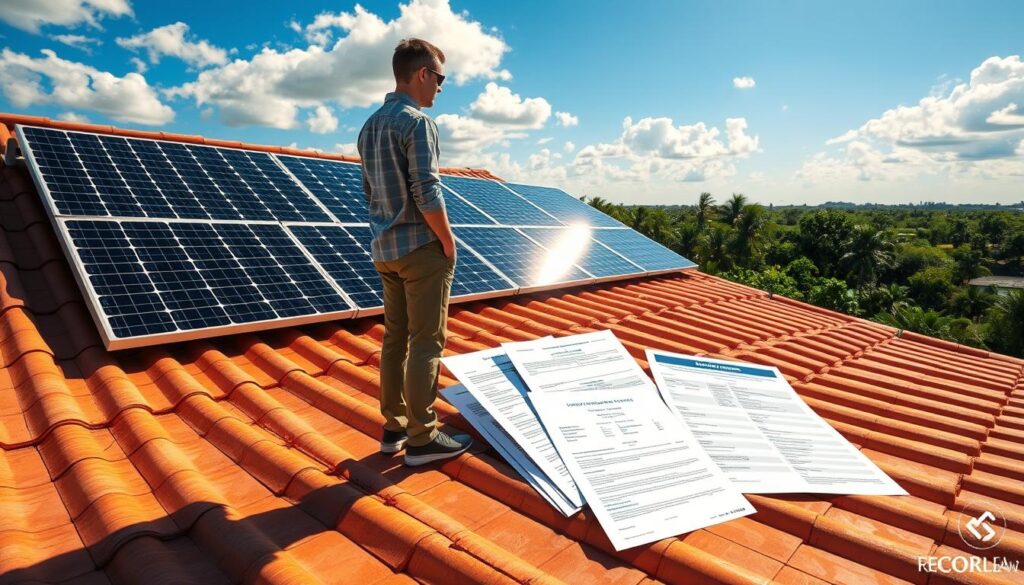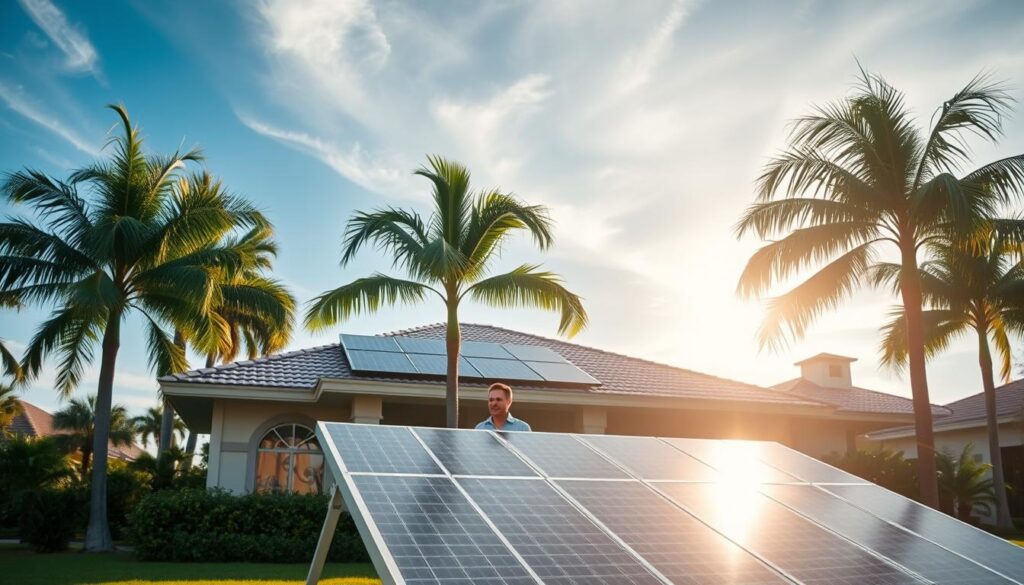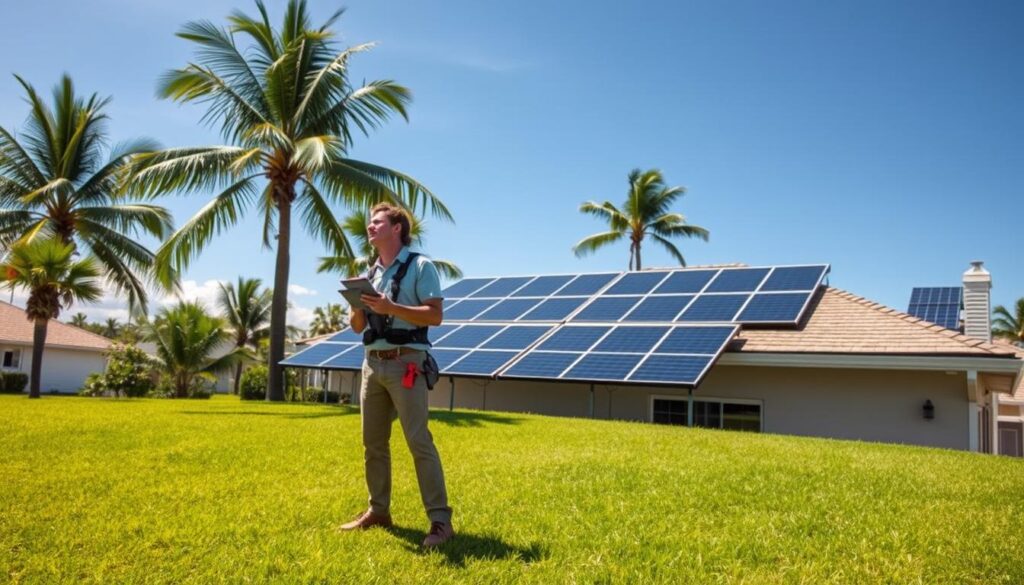Protecting your solar panels florida insurance is vital as Florida’s solar energy market grows. Since 1965, Harris Insurance has guided homeowners through Florida-specific coverage. With thousands of new installations monthly, proper insurance ensures compliance and safeguards investments against storms and liability claims.
Tier 2 solar systems over 10 kW require a $1 million Personal Liability Policy (PLP).) Florida law mandates this coverage to avoid penalties. Federal tax credits cut 2022 installation costs by 26%, saving up to $7,800 on a $30,000 system. But deadlines like June 30, 2022, for grandfathered net metering add urgency to act now.
South Miami now requires solar panels in new homes, making insurance essential. Without coverage, storm damage or equipment failure could leave you liable for repairs. Solar shortages may raise costs by late 2022, so securing quotes within seven days is key to locking in rates.
Key Takeaways
- Harris Insurance has been Florida’s homeowners insurance leader since 1965, specializing in solar-related policies.
- Tier 2 systems (10–100 kW) need $1M liability coverage via a Personal Liability Policy (PLP.)
- Federal Tax Credits reduce 2022 installation costs by 26%, but savings drop 4% after December 31, 2022.
- Florida solar owners must submit interconnection applications by June 30, 2022, to qualify for net metering benefits.
- PLP insurance averages $14/month, but solar supply shortages could increase costs starting late 2022.
Understanding Solar Panel Insurance in Florida
Florida’s solar energy boom means more homeowners need to understand solar panels florida insurance. This coverage safeguards investments worth $8,000 to $30,000, ensuring systems survive storms and stay compliant with state rules.
Florida utilities divide systems into tiers. Tier 2 systems (over 10 kW) must carry a $1 million Personal Liability Policy (PLP), averaging $14/month). Smaller Tier 1 systems (≤10 kW) don’t need extra insurance, but all homeowners should review policies.
What is Solar Panel Insurance?
This insurance protects against damage from storms, fire, or accidents. It’s distinct from standard homeowners coverage. Tier 2 owners must prove PLP to utility companies, avoiding service disruptions.
Why Do You Need It?
Florida law mandates PLP for larger systems. Without it, utilities may refuse connections. Severe weather like hurricanes or wildfires can destroy panels, making insurance critical. Even small systems benefit from policies covering wind or hail damage.
Common Coverage Options
Plans often include:
- Liability protection for accidents caused by panels
- Equipment replacement after disasters
- Costly repairs from storms
However, most policies exclude gradual wear or theft—unless added via endorsements. The best solar panel companies in Florida can guide you toward installers who meet insurer standards, streamlining claims.
Manufacturers cover defects for 25 years, but they don’t address weather or liability. Combining warranties with proper insurance ensures full protection for your investment.
The Importance of Protecting Your Investment
Solar panels aren’t just a modern convenience—they’re a long-term investment that boosts your home’s value and energy independence. In Florida, homes with solar panel installation florida often see property values rise by up to 4%, according to recent studies. These gains, combined with solar panel incentives in Florida like tax credits and rebates, make going solar a smart financial move. But without the right safeguards, those gains could vanish overnight.
How Solar Panels Increase Property Value
Florida’s sunny climate makes solar energy a top choice for homeowners. A 2023 study by the National Renewable Energy Laboratory found homes with solar systems sell faster and for higher prices. Many solar panel incentives in Florida programs, such as state rebates and federal tax credits, further sweeten the deal. Properly installed systems can cut electricity bills by 25-30%, making homes more attractive to buyers.
Potential Risks Without Insurance
Ignoring insurance leaves your investment exposed. Consider:
- Repair costs for hurricane damage can exceed $10,000
- Uninsured homes face personal liability if panels fall and damage neighboring property
- Outdated installations failing Florida’s wind-resistance codes may void insurance claims
Without coverage, fixes come out-of-pocket. Florida’s volatile weather means even well-maintained systems need protection against storms, theft, and vandalism.
Types of Solar Panel Insurance Policies

Homeowners in Florida have options when it comes to protecting their solar panels florida insurance. Understanding the differences between policy types helps ensure your system stays secure. Let’s break down the main choices available.
Homeowners Insurance and Solar Panels
Many standard policies cover roof-mounted panels under dwelling coverage, but limits apply. Key points:
- Roof-mounted systems may be covered for fire or theft, but wind/hail damage often requires endorsements.
- Ground-mounted or detached systems may need separate coverage under “other structures” or add-ons.
- Verify if your insurer (e.g., State Farm, Allstate) requires updates to your policy after installation.
Specialized Solar Insurance
For comprehensive protection, specialized policies address gaps left by homeowners insurance. Benefits include:
- Coverage for production loss if panels fail to meet energy output guarantees.
- Options for systems exceeding 11.7 kW, like Tier 2 and 3 setups (see table below).
- Plans tailored for affordable solar panels Florida installations, balancing cost and coverage.
| Tier | Capacity | Requirements |
|---|---|---|
| Tier 1 | ≤11.7 kW | No interconnection fee |
| Tier 2 | 11.8–100 kW | $400 one-time fee + liability policy |
| Tier 3 | >100 kW | Customized commercial coverage needed |
Warranties vs. Insurance
Manufacturers provide warranties covering defects (e.g., performance issues), parts failures). Solar panels florida insurance steps in for external risks like storms or vandalism. Combining both ensures full protection. For example, warranties don’t cover hurricane damage, but specialized policies do.
Shopping for coverage? Start by reviewing your current policy details. Then compare quotes to find affordable solar panels Florida solutions that align with your system’s size and risks. Your installer can also guide you toward reliable providers.
Factors Influencing Insurance Costs
Insurance premiums for solar panels vary based on where you live, your system’s size, and how it’s installed. Understanding these factors can help you secure affordable solar panels Florida coverage while protecting your investment.
https://www.youtube.com/watch?v=H54yJI6Ql38
Location-Specific Risks in Florida
Florida’s climate plays a major role. Coastal homes face higher premiums due to hurricane risks. Areas in flood zones or regions with frequent hailstorms see increased rates too. Insurers evaluate local weather patterns and crime rates when setting prices. For example, Miami-Dade County’s hurricane exposure often leads to higher premiums than inland areas.
Size and Type of Solar Panel System
Large systems over 10kW cost more to insure. Rooftop panels may need different coverage than ground-mounted setups. Choosing affordable solar panels Florida brands with strong warranties can lower long-term costs. Systems with advanced safety features like lightning protection may qualify for discounts.
Installation Factors
Professional solar panel installation florida by licensed contractors reduces risk and lowers premiums. DIY setups might void coverage or raise rates. Insurers prefer installations meeting Florida’s building codes, such as anti-hurricane mounting systems. Proper installation can even earn discounts through safety certifications.
Homeowners can save by selecting certified installers, using risk-reducing equipment, and comparing quotes annually. Smart choices today mean better protection and savings tomorrow.
Benefits of Having Solar Panel Insurance
Protecting your solar investment starts with the right coverage. Solar insurance in Florida ensures you maximize savings from Florida solar panel tax credits while avoiding unexpected costs. With severe weather risks, this protection keeps your energy future secure and your home powered.

Peace of Mind for Homeowners
Imagine a storm hitting your roof—but your panels stay intact. Solar insurance shields you from disasters like hurricanes and hailstorms common in Florida. With policies from trusted providers like best solar panel companies in Florida, you avoid downtime and repair costs, ensuring uninterrupted energy production.
Financial Protection Against Damages
Solar insurance guards against costly repairs after natural disasters. Policies from companies like Tower Hill Insurance Group cover up to $10,000 in damage, eliminating out-of-pocket expenses for replacements or labor. This support preserves your investment’s value and aligns with savings from federal tax incentives.
- Storm Damage: Repairs covered after hurricanes or lightning strikes
- Equipment Loss: Reimbursement for stolen or vandalized panels
- Warranty Backups: Covers issues missed by manufacturer warranties
Coverage for Additional Equipment
Top-tier policies protect inverters, batteries, and mounting hardware. Systems installed by licensed professionals—like those from best solar panel companies in Florida—ensure full coverage eligibility. This extends to microinverters systems and energy storage units, safeguarding every part of your setup.
By pairing insurance with tax credits and reliable installers, homeowners secure long-term savings and reliability. Florida’s solar boom means choosing the right coverage is as vital as selecting quality panels.
Choosing the Right Insurance Provider
Selecting the ideal solar panels florida insurance provider demands careful research. Start by prioritizing carriers experienced with Florida’s unique risks, like hurricanes and high sun exposure. Agents unfamiliar with solar systems may overlook critical details—like the $1M Personal Liability Policy (PLP) required for grid-connected systems. Below are actionable steps to guide your search.
Key Questions to Ask Your Insurer
- Do you cover solar panels under standard homeowners policies or require supplemental riders?
- Is coverage available for detached structures like barns with solar arrays?
- What exclusions apply to hurricane damage or installation-related accidents?
- Will my premium increase if I add a 15kW system exceeding tier 2 requirements?
Comparing Quotes and Coverage
When evaluating solar panels florida insurance offers, scrutinize fine print. Compare:
- Coverage limits vs. system replacement costs
- Hurricane damage payout terms
- Whether installation-related claims are covered
Providers like Progressive and American Integrity Insurance cover storm damage after deductibles, while Herbie Wiles and Edison Insurance Company may refuse coverage entirely. Verify if policies meet local utility interconnection agreements. Explore solar panel financing options Florida programs that bundle insurance with installation packages. Always confirm:
“Your policy must align with your utility’s PLP and tier requirements.”
Pro tip: Ask for written confirmation of solar-specific terms before finalizing. A well-chosen provider ensures your investment stays protected against Florida’s unpredictable weather and regulatory demands.
Common Claims Made on Solar Panel Insurance
Florida’s unpredictable weather and high theft rates mean solar panel owners often file claims for damage or loss. solar panel installation florida experts note three main scenarios: storms, theft, and equipment failure. Understanding these helps homeowners prepare for potential issues.

- High winds and hail from hurricanes cause cracked panels or roof damage.
- Florida leads in wind-related claims, with average payouts exceeding $79,000.
- Insurance covers repairs but requires proof of damage and installation receipts.
Theft or Vandalism Incidents
Inverters and batteries are prime targets. Claims require police reports and photos of stolen items. Homeowners with solar panel incentives in Florida programs must ensure their policies cover high-value components like Tesla Powerwalls or Enphase microinverters.
Equipment Malfunction and Repairs
Manufacturing defects fall under warranties, while external damage (like squirrel damage or lightning strikes) requires insurance. Policies typically exclude gradual wear but cover sudden incidents like power surges.
Pro tip: Track maintenance records and keep copies of solar panel installation florida contracts. This speeds up claim approvals after disasters.
Tips for Filing a Claim
Navigating a solar panel claim starts with organization and clear steps. Proper documentation and quick action help ensure fair compensation for repairs. Knowing how to work with insurers builds confidence during the process.
“Homeowners may need to increase their coverage amount due to the increased value of their solar system, which can enhance home value.”
Documenting Your Solar Panel Installation
Keep records of every step of your solar journey. Save:
- Purchase agreements and installation invoices
- Permits and inspection certificates
- Date-stamped photos showing system condition
Top-rated best solar panel companies in Florida often provide digital portfolios of installations, simplifying post-damage comparisons.
Steps to Take After Damage Occurs
When damage happens:
- Take photos/videos of damaged panels and equipment
- Secure the site to prevent further harm
- Contact your insurer within 24–72 hours
- Keep witness contact details if applicable
Working Effectively with Your Insurer
Track every conversation with your insurer. Ask about:Florida solar panel tax credits eligibility for repair costs. Verify coverage limits match your system’s current value. If disputes arise, ask about public adjuster options. Always request written confirmations of decisions.
A well-organized claim process reduces stress. Start by reviewing your policy details and keeping all paperwork updated. This prepares you for any unexpected issues down the line.
The Future of Solar Panel Insurance in Florida
Florida’s solar energy boom continues, with solar powering 67% of new U.S. electricity capacity in 2024. As adoption soars, insurance solutions must adapt to protect this growing investment. Innovations in coverage and tech will shape the next phase of solar ownership.
Industry Trends and Innovations
Insurance companies are refining policies to address Florida’s hurricane risks and aging infrastructure. Smart monitoring systems now alert insurers instantly to damage, reducing claim delays. Net metering shifts mean homeowners must review grandfathered agreements to avoid gaps. Rising premiums—up 15–45% for property coverage—highlight the need for policies that balance cost and protection against storm damage and manufacturing defects.
Emerging Companies and Technologies
New insurtech firms are tailoring coverage for solar systems, using AI to streamline claims. Advances like self-healing panels and reinforced designs may lower long-term insurance costs. Solar panel financing options Florida programs and affordable solar panels Florida deals are expanding access, but require careful review of warranty terms and installation quality. Emerging tech also means policies must keep pace with evolving risks like cyber threats to smart systems.
As Florida leads in solar growth, staying informed about coverage upgrades and market shifts is key. Regularly updating policies ensures your investment stays shielded from both old and new challenges in this dynamic energy landscape.
